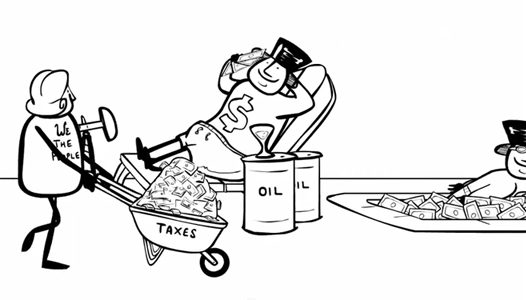- Blog
- Sustainable Economic Systems
- Cheater economics
Cheater economics

Donate Now!
Your contribution will benefit Friends of the Earth.
Stay Informed
Thanks for your interest in Friends of the Earth. You can find information about us and get in touch the following ways:
Cheaters are lurking in the U.S. economy, corrupting what should be an honest game of production, commerce, and trade. “Cheater economics” refers to the corporate welfare system in which corporations are given special tax subsidies and granted access to loopholes for avoiding tax payments. Cheater economics drains away needed tax revenues, leaving governments with the lose-lose choice of running up deficits or reducing services, or both. Often this means cutbacks in environmental, health, and safety protections. Thanks in no small part to the cheaters, the debate on public finance in the United States has shifted to deficits and the need for cuts. To those seeking funds for worthwhile programs, the answer is, “Sorry, we’re broke!”
We must reframe the debate if we wish to eliminate corporate abuses and get serious about establishing a sustainable, steady state economy. And we should start by getting rid of the cheaters.
Some examples of cheater economics are blatant, such as welfare handouts to polluters. It’s bad enough that corporations are allowed to externalize the high costs of their polluting activities, but what’s worse is that taxpayer funds flow to dirty industries (e.g., oil and nuclear reactor companies) in the form of direct handouts and tax loopholes.
Other examples of cheater economics, however, are more subtle. One of the less well-known rip-offs, which benefits the top 1% of income earners, is a taxpayer subsidy for short-term speculation in derivatives. Traders, who can buy and sell complex derivatives in a matter of minutes, are allowed to claim a large portion of the resulting income not as a short-term capital gain, but as a long-term gain (which is taxed at a lower rate). Fortunately, the Senate is looking into this rip-off, and Senator Carl Levin (D-Mich.) has introduced legislation to shut it down.
Republicans and Democrats alike have helped set the stage for cheater economics through financial deregulation. Today’s Republican leadership continues to push for deregulation, but prominent Democrats, going back to President Clinton’s Treasury Secretary Robert Rubin, have also been prime drivers of financial deregulation.
President Obama won the election in 2008 just as the financial system collapsed in response to the deregulatory extravaganza promoted by both Republicans and Democrats. Those that destroyed the financial regulatory framework by repealing effective laws, such as the Glass-Steagall Act of the 1930s, brought on the devastating subprime collapse.
But Obama, as a new president with tremendous support, failed to seize the initiative in 2009. Instead the aggressive right wing brilliantly framed the debate over the size of government, the tax code, and unemployment. Thus the Republican leadership established a strong message in favor of: 1) cutting government spending as the way to deal with the deficit, 2) abolishing EPA’s environmental regulations as the way to relieve unemployment, and 3) maintaining low taxes on the wealthiest 1%, because raising taxes is never the solution.
And now there’s another looming setback to efforts aimed at reining in the cheaters. The IRS, the tax collection arm of government, is being cut, which will seriously limit the agency’s reach when it comes to tracking tax dodgers and overseeing the collection of legitimate tax payments.
The election year offers a prime opportunity to push back against cheater economics by reframing the debate. Let’s start asking who is hijacking the revenue. We are not broke. Simply closing the numerous tax loopholes would bring in more than the $1.2 trillion the Republican leadership has been demanding in budget cuts over the next decade.
Annie Leonard, the creator of the popular Story of Stuff video, is leading the charge to reframe the debate. Her new video, The Story of Broke, calls for a shift in government spending to invest in renewable energy and other industries that can provide jobs and a healthy environment. Another movie, We’re not Broke, is also helping to change the message. This new film, backed by the Tax Justice Network, tells the story of how corporations are dodging taxes and how seven fed-up citizens are working to make the corporations pay their fair share.
Another way to reframe the debate is to showcase the benefits of environmental regulations. A review of the scientific literature on the causes of job loss shows that environmental compliance costs are small. Only among a handful of the big polluting industries are the costs greater than two percent. Furthermore, the health benefits of environmental regulation are enormous.
The U.S. Bureau of Labor Statistics notes that safety and environmental regulations are responsible for only 0.1 percent of job losses. Frank Ackerman’s Poisoned for Pennies provides more details on this story. Despite the facts, various presidential candidates and the congressional Republican leadership persist in attributing the loss of jobs to environmental regulations and call for the elimination of the EPA.
So the question to both Republican and Democratic candidates this year should not be, “What are you going to cut or deregulate?” The question should be, “Why aren’t you getting rid of cheater economics?” Now is the time to demand the honest economy we all deserve.
(Cross-posted from the Center for the Advancement of the Steady State Economy.)
